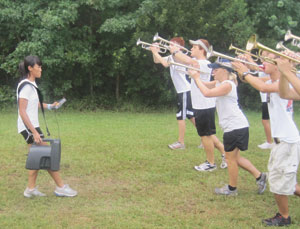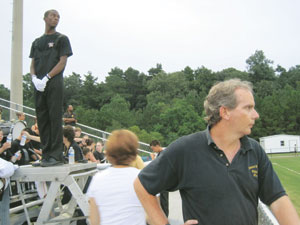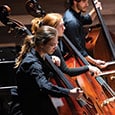
Band directors have the same funding shortages as every other teacher in addition to the pressure of performances for the public – football shows, marching festivals, competitions, concerts, and contests – throughout the year. Adding to the stress is the fact that many schools have only one director, regardless of their size, with assistant positions scaled down if the district reduces its budget. Even in difficult financial times, it remains incumbent on directors to create strong, vibrant programs, and one way of doing this is through well-trained student leadership.
Although training student leaders takes time, having multiple ears and eyes in the rehearsal hall and on the football field increases the odds of spotting weak areas that a sole director can miss. When section leaders and marching assistants are a part of band, directors find themselves accomplishing much more, especially with the details of the broader aspects of the program.
Although school is just now underway, this is the best time to begin the process of identifying student leaders so that in the spring of 2011 you can prepare them for their responsibilities the following fall.

Student Leaders’ Responsibilities
The first place to look for student leaders is among the section leaders and first-chair players. Each student leader has a specific job, whether it is on the marching field or in the rehearsal hall. I suggest writing a list of the respective responsibilities and review it periodically as you consider various students. Here are the areas of leadership that I use for band and the responsibilities of each position.
Librarian. This student is responsible for knowing which parts are needed for each piece as well as copying drill and hole punching individual sheets for the students’ binders. This person needs to know the correct number of parts and when the director wants to rehearse each work. The librarian’s job is ongoing, and all band members should go to this person for music, drill, or other paper items. A good candidate for this responsibility is the student who wants to help you in your office or organizes things around the band room without being asked.
Equipment Captain: These are one or two student leaders who are responsible for knowing what to load on the trucks for each event. Suggest that they create a checklist using information from the pit, drum line, section leaders, guard captains, etc. Before the first event, the equipment captains should know how to load each piece of equipment into the truck and determine the best place for it. Each captain directs a group of students known as quartermasters who bring the items for loading on the truck.
The number of items to load determines the number of quartermasters. These students, along with the pit players, are the first off the bus; they unload the equipment and arrange it before the rest of the group touches anything. For the first few events, you should verify every piece of equipment, but ultimately this work is the responsibility of the equipment captains, their checklists, and the quartermasters.
Captains. These are the marching specialists for the band, with one person from the woodwind, brass, percussion, and guard sections of the ensemble. They are responsible for teaching basic marching technique to everyone in their section, and their technique should provide a stellar example of the best marching in the band.
Whether you select or elect these students, they should have good posture and playing technique and show themselves to be dependable. You will be spending extra time with these students to define every aspect of marching technique; in turn, they will be working with small groups of players, defining marching technique to them, and they will be your extra eyes on the field. They work with posture, foot placement, marching in time and step, and instrument carriage.
Section Leaders. These students have the best instrumental technique in the band. They are responsible for making sure everyone in their section plays all of the notes, knows every fingering, and understands the rhythms in each part. You will spend time explaining tempos, articulations, and style to them. These players become your workhorses for the band, checking the notes of every student in the section and reporting the names of those who need help to you.
Section leaders can also tutor students, which will improve their own understanding of the music. There should be a section leader for each type of instrument (low brass, high brass, flutes, clarinets, etc.). Guard section leaders are responsible for working small groups on flag skills to polish technique and check hand positions.
.jpg) Drum Majors. These are the top student leaders in the band. They should understand the music and drill; and you should confer with them to be sure they understand your tempos, musical interpretations, and marching goals. They should be prepared to teach marching and music. Further, the drum majors lead officer meetings along with you, and they are the first liaison to the band members for any minor problems.
Drum Majors. These are the top student leaders in the band. They should understand the music and drill; and you should confer with them to be sure they understand your tempos, musical interpretations, and marching goals. They should be prepared to teach marching and music. Further, the drum majors lead officer meetings along with you, and they are the first liaison to the band members for any minor problems.
Directors work closely with their drum majors, giving them parts and copies of drill as soon as possible, making sure they understand how to read a score and conduct with clear gestures. Drum majors should be able to rehearse the music instead of just waving their arms in a set pattern. These leaders are usually upperclassmen who are highly respected by the other students in the band. You should select them through an audition as well as an application and interview.
Identifying Student Leaders
While it is important to encourage students who stand out to apply for leadership positions, keep in mind the positions that need filling from the beginning of the school year. During the winter concert season, your goal should be to pick out students who seem to have an eye for setting up and arranging staging for concerts. These are future equipment captains. A quiet, studious student who has a meticulous music folder and makes sure everyone has the correct part is a potential future librarian.
Section leaders seem to identify themselves because they will naturally help younger or weaker players learn concert music or invite everyone over to practice. Directors who are honest about the strengths of their players should be able to identify prospective student leaders by early in the spring so there is time to work with them through to the end of the school year and in the summer in preparation for the following fall marching season.
Once you identify these band members, be sure they have the respect of their peers in the band program. Section leaders and captains should be able to communicate effectively and have the musical knowledge to explain the same concept several ways. Observe how the possible candidates interact with the other players in their sections. Popularity is not a criterion for choosing a leader, but the ability to communicate and motivate others is important.
The goal should be to select band officers carefully, identifying a group of people who are respected within the band and who are able to, under your guidance, teach small groups. This will give your student leaders greater pride in the band program, and in turn they will become more concerned with scheduling practice sessions with other players and helping weaker students to catch up with the others. Some students even take more interest in the general upkeep of the band room. Instead of simply playing in the school band, they become a vital part of an organization that they have helped to design and govern.
.jpg)
The Process of Selecting Leaders
In my school I use a three-part process for selecting the students in most positions. First, students fill out a formal application for leadership, including a resumé, and submit teacher recommendations. Next they interview with me and with the band, and students ask questions of the candidates to determine their qualifications to lead. The final part is an audition.
The audition for section leaders requires applicants to teach a new piece of music to a group of students in a rehearsal, which the director observes. I have found excellent students who surprised me as competent teachers when they lead a rehearsal for the first time. Your best performers, I learned, are not necessarily the best teachers. Further, this process gives each student a fair chance at showing his abilities.
A similar process can help identify captains but using prescribed marching techniques while teaching a group. The most important part of selecting leaders and having them respected is to have a fair and transparent selection process. Assume that each selection is going to be challenged and have a rating scale and selection rubric ready to explain to administrators and parents. If the process is clear and fair, your leadership will have a head start in gaining the cooperation of the group and the support of the administration and parents.
A Closer Look at Drum Majors
In my school I expect the drum majors to have the same duties as the captains and section leaders. While they will better at their instrument, they will also have some knowledge of the other instruments and know if a passage is high for the trumpets or low for the clarinets. Their marching technique should be as good as or better than the captains’ so that they can also observe the overall group.
Students usually are eager to be drum major and willingly learn what is necessary for the audition. For example, players who are trying out for drum major may talk to me about certain areas of score reading and marching and look on YouTube to review marching techniques.
The drum major audition includes vocal commands (I want to be sure they will be heard) in addition to conducting a piece from the previous year. They also conduct “The Star Spangled Banner” from memory so I am sure they conduct clearly and musically and know where they are in the score. Being a drum major includes having rudimentary conducting skills that I can build on. The last part of the audition is an interview in which I make it clear that I am looking for a candidate who will serve the band in whatever way he can, even if he is not an officer.
Drum major auditions are held first, before the auditions for the other officers, so those who don’t make drum major can still tryout for the other positions. Many of the students who do not make drum major are well prepared for their auditions and make excellent section leaders or captains.
It has always been interesting to see that a low percentage of seniors fill the new leadership positions. About 50% of the leaders are seniors and the remaining are juniors and occasionally sophomores. This year both drum majors at my school are seniors, which is unusual because I usually have one senior and one student who is younger.
When juniors are drum majors, the question always comes up as to whether they should reaudition for the position. This year one drum major was a junior last year; she was outstanding so there was no need to for another audition. If a drum major was weak, I would have another audition.
When the band members interview leadership candidates, some will ask questions like, “What is your concept of discipline?” “How should the band sound?” “What qualifies you to teach?” and “How are you going to improve on the work of last year’s drum major or section leader?” Sometimes students who know each other will address more personal areas: “I know you have a problem with anger in other classes. Will that be a problem in band?” I never see the students outside of band, so I’m grateful when they bring up questions I would not have thought to ask.
By asking leadership candidates for a resumé, I give them the experience of applying for a job. As part of the resumé students include various church activities, previous officer positions, and whether they play in local community ensembles or take private lessons. Their contact information and music education are also important. Because the music program at my school is large and I am the only director, I don’t always know the students as well as I would like, so it is helpful to learn about their other musical activities. If someone is applying for a librarian position, I may not know that he also volunteers at the public library.
One of the drum majors this year was a quiet flute player who was near the top of the section as a freshman and sophomore; she was very respectful but never said much. When she applied for the drum major position, I wasn’t sure how it would go, but she was fantastic. Because she was so meticulous as a concert musician and in her other school work, she ended up a fantastic leader.
This year the drum majors are outstanding, so I can tell them the intervals at the rehearsal yesterday were poor and let them decide what to do in basics block at the start of rehearsal. If the leadership is weak or the drum majors are out and the captains direct a rehearsal, I give them a specific list of the areas to review.
Leadership Training Begins
If possible, student leaders should attend a leadership camp, but another option is to run your own camp each summer before band camp begins. I begin leadership training camp telling the students my concept of leadership. For some band directors this means students follow specific instructions while other directors point students in a certain direction and let them go until they need to be reined in. In my experience, student leaders get frustrated if they don’t have clear directions. If they think they are doing the right thing, but you jump all over them because they go too far or not far enough, that is the fault of the band director. So state clearly what you expect student leaders to be able to do, which they should know from before the audition.
One important rule to impart during leadership training is that the director’s wishes are final. I say that because about 10 years ago I had the interesting experience of working with a drum major who was of the opinion that she ran the band. One day I told her from the stands, “This is the next thing I want to do.” She turned around and said, “Well I don’t want to bust your bubble, but we can’t do that.” I stood there thinking, did that 16-year-old just say she didn’t want to bust my bubble?
It was a memorable reminder that every student needs to follow whatever you say. While it is important to give drum majors and student leaders latitude based on what they have learned, they still have to understand your word is final.
For the next portion of training, students identify the characteristics of good and bad leaders. They also set their own rules, such as treat everyone in the band as equally as possible and with the same respect. Once they understand basic rules of decorum, we begin working on marching technique, such as how high to raise the toes, how high the heel should come up for back marching, the angle of the arms at attention, and the level of the horn. While the students practice these skills in small groups and teach each other, I make sure everyone is using the exact same wording.
Finally, students learn what they should be doing to teach a sectional. During summer camp this is usually as simple as making sure everyone uses the right fingering and that there is a balance of parts. Everyone wants to play first part, so section leaders occasionally make sure the students are playing their assigned parts.
Next I talk about dynamic contrast and identify how to hear pitch, find where sections begin and end, and balance parts. In most cases section leaders take private lessons so I know their performance is good, but sometimes the best players are not the best teachers. All the section leaders learn how to break down a skill to its individual parts and explain it, step-by-step.
I always give section leaders and captains specific directions. Drum majors know how to start rehearsals if I have to answer a telephone call from the band boosters, meet with the principal, or call a parent; section leaders and captains, however, have a more specified jobs. I may tell them to “run the opener from letter A-B making sure everyone is on the right fingerings in the run.” From there they practice teach and review. The student leaders also help me with plans for band camp, making specific plans for each day so everyone understands basic commands like attention and the first step for forward march.
Benefits for Directors
One benefit of training student leaders is that you suddenly have more ears listening to the music; more ears to catch the problems that are easy to miss during rehearsals and performances. Additionally, by having your drum majors develop the competence to conduct the show music, and by having the section leaders trained to conduct music during their sectionals, you can listen and observe like a judge. This gives your the perspective of a judge, so you now have the ability to make constructive comments and fix problems that you missed while conducting.
After identifying problem areas, either in sections or in full band, you can have student leaders make corrections or take over the rehearsal to correct what you hear. It is best to have the drum majors do the bulk of the conducting because they are the ones your band is watching on the podium on Friday nights. It is ideal for the director to make corrections, then have the drum majors drill the newly corrected section.
Another result of this system is that a director can more easily maintain his professional demeanor, meaning he doesn’t have to yell to be heard across the marching field. If a trained student staff carries out his directions, then he should be able to speak to the group using a megaphone in a calm manner and not raise his voice.
Marching Band Rehearsals
The drum majors, using their captains, should be able to run basics for the marching band with the basic block techniques that you give them. As the drum majors lead the students, you can be sure everyone is in place, and you can observe students closely to see where corrections need to be made in technique while they are marching. You should bring these corrections to the appropriate captain to work on with the struggling students. To make this work, you have to define each marching technique so the various block exercises have meaning, whether it is raising of the heel when back marching or rolling the foot down to move forward. Again, block gives you the opportunity to make sure everyone in the band has a unified marching technique.
Following basics block, the director leads the rehearsal by telling the band which portions of the show they will rehearse, then the drum majors become the field conductors. During rehearsal captains simply march in their spots. If I see something I don’t like I will ask captains to step out and check it; they get their drill books out and check everyone. If the captains are not needed they just march; when they are needed they step out and observe or fix. Because the students are used to listening and following commands from student leaders, drum majors and captains should be able to help correct students with poor marching technique, spacing problems, and drill reading from the field. This gives the director the ability to see the corrections as they are being made.
At the end of rehearsal, after the director’s final announcements, the officers should have a moment for any final comments that apply to the common good. The officers should be responsible for making sure that the practice field and room are in good order before leaving.
The Balance of Power
The amount of power to give to student leaders is important. First, check with the school district’s student handbook. In many cases, it will state that only the teacher should handle discipline and no student may assign a disciplinary action. In other schools you may have latitude to have certain officers assign discipline as required to keep order.
Whether the director retains all of this himself or allows only the drum majors to assign some of the discipline, remember that the director is solely responsible for any discipline assigned and he will be the one to explain any problems to the principal or parents, so be very careful to monitor disciplinary actions to eliminate abuse of power by student leaders. That having been said, if student leaders are following the director’s process and he gives them specific goals for each rehearsal or sectional, there will be a tremendous decrease in the need for reactive disciplinary actions.
Student leadership and peer guidance work well to discourage misbehavior because students want to be accepted by other students, which eliminates adversarial student-to-teacher problems.
At my school I assume responsibility for all discipline. I don’t want to risk having a 15-year-old student tell a band member to run laps and then have the disciplined player pass out. Within sectionals, if section leaders think the group needs to do more work on basics to polish a marching technique or rehearse a section of music longer, I give them that latitude. After my authority, the drum major’s authority is next. If drum majors understand what you want and the process by which you want to achieve your goals, captains and section leaders can go to the drum majors with most of their questions.
Creating Student Leaders
It will take time to identify and train student leaders, but the extra eyes and ears on the field are worth the investment. This is not a quick fix, as it may be necessary to introduce responsibilities gradually, but by allowing students to rise up to meet the challenge of leading their peers, directors can make the best use of their own skills and time.





